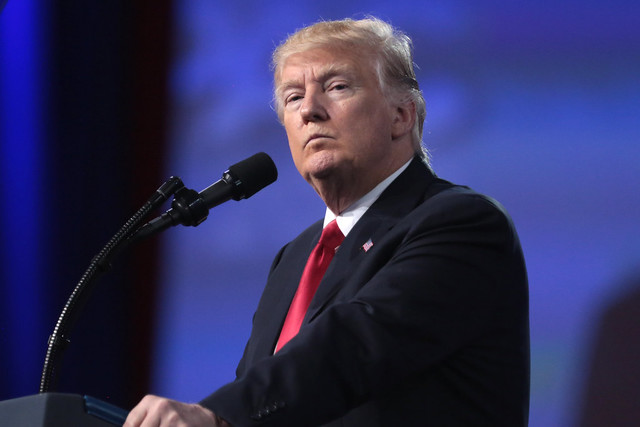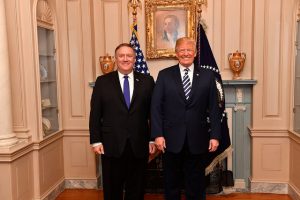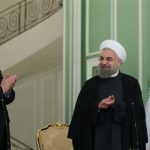by Paul R. Pillar
Seemingly endless threats, insults, punishment, and attempts at coercion have been a leading feature of Donald Trump’s foreign policy. The pervasive bullying so far has not been matched by a comparable degree of positive results, as many have noticed. North Korea’s nuclear arsenal is no smaller than it was when Trump took office. The trade war with China is escalating rather than being resolved. Policy toward Iran is a multifaceted failure. Tehran hasn’t moved toward negotiating a “better deal,” any claim that Iran’s behavior has improved is contradicted by the Trump administration’s other claims of new military threats from Iran, and now Iran is about to exceed nuclear limits that it had been scrupulously observing under a multilateral agreement that Trump has endeavored to destroy.
What has passed for success, mostly involving trade in North America, has followed the Trumpian model of starting a fire to claim credit for extinguishing it, and of claiming as a major breakthrough something that is barely different from a previous arrangement that Trump denounced as awful. Trump’s trade agreement with Canada and Mexico represents minor tweaks to the previous North American Free Trade Agreement (NAFTA), which Trump had assailed as “one of the worst trade deals ever made.”
Trump’s more recent threats of imposing tariffs on Mexico to get action on the unrelated matter of Central American migration have resulted in an understanding that involves measures Mexico was mostly taking already before the threats, including promised deployment of a recently established paramilitary force that still mostly exists only on paper. The exact terms of the understanding remain unclear, as Mexico denies Trump’s claims of a “secret” agreement. But the major backdown appears to have been on the U.S. side, including dropping insistence on moving directly to a “safe third country” treaty that would require Central American migrants to seek asylum in Mexico.
Assessments of success or failure need to specify, of course, the policymaker’s objective and the standard for measuring success. Trump’s technique of manufacturing a crisis in order to be seen resolving it may, in his view, be successful in serving his dominant objective of appealing to his domestic political base. Other comparably parochial political objectives may be served by unending hostility and tension with some of the foreign adversaries that are the targets of the bullying. A bête noire can serve a purpose as a foil and rallying cry. For the Trump administration this may be true of permanent hostility toward Iran, as it is even more clearly true for Trump’s political partner, Israeli Prime Minister Benjamin Netanyahu. But neither of these sorts of political objectives should be confused with U.S. national interests, which provide the proper standard for measuring success.
Each of the administration’s failures to date can be explained in large part in terms of the details of the specific country and relationship involved. But some general shortcomings of the bullying approach to foreign relations, including the following five, are common to all the cases.
People don’t like to be bullied. Resistance is the default response, and a very human response, to attempted coercion. The resistance appears on two levels, one of which is emotional and involves the simple and universal dislike of being bullied. The other level is the more calculated one of avoiding a reputation of giving in to bullies. The understandable fear is that concessions made under coercion will just encourage more demands and more coercion.
The target of bullying has strong policy and political reasons not to change. If a country already has been doing something despite U.S. displeasure, it must have compelling reasons to do it. Those reasons tend to get downplayed or overlooked on the U.S. side amid rhetoric that portrays the behavior in question as unreasonable. What the targeted country views as reasonable, and sometimes even vital, affects its decisions more than what other governments think. The North Korean nuclear arsenal that the rest of the world sees as a threat to peace Kim Jong-un sees as an important ingredient in his regime’s survival. What other countries may legitimately view as unfair Chinese trade practices Beijing sees as ingredients in China’s rapid economic growth. Iranian regional activity that the United States describes as “nefarious” serves, in Iranian eyes, purposes important to Iranian security. Such situations may be amenable to negotiation and compromise that takes account of each side’s interests and concerns. They are not amenable to the bullying formula of one side coercing and demanding and the other side folding.
The bully fails to provide positive alternatives. There may be something inherent to the bullying mode that tends to make it all stick and no carrot. In any event, the Trump administration has at times seemed to fall into an all-stick mode, most obviously in its policy toward Iran. Claims that the “maximum pressure” campaign has provided “leverage” are false; there is no leverage when the other side has been given reason to believe that it will be punished no matter what it does. And the more that Trump describes tariffs as good in their own right and economically beneficial to the United States, the less incentive there will be for trading partners to respond to tariffs as a temporarily imposed instrument of coercion that they can count on going away if they comply with U.S. demands.
Incessant bullying loses credibility over time. The loss of credibility is twofold. Repeatedly sacrificing accommodation and positive accomplishment for the sake of more bullying leads the other side to conclude that the bully will not live up to agreements. This again kills the incentive to reach new agreements. Trump has exhibited this problem not only with agreements reached before he entered office (as with the Iran nuclear accord), but even ones reached during his administration—most notably, his own North American trade agreement, which he evidently was willing to undermine for the sake of using tariffs to try to coerce Mexico on the migration issue. There also is a loss of credibility regarding the bully’s perceived determination to carry through on his threats. With many threats being made, some of the target countries will not fold, and some threats will not be carried out. Other countries notice this and will be less scared the next time the same bully threatens them.
Even bullies need agreements. The model of one side demanding and the other side complying does not square with the many situations in international relations in which a lack of agreement means both sides lose. This is true even for the world’s superpower. And it affects politics inside the superpower, as illustrated by Republican opposition to Trump’s threatened tariffs against Mexico and how that opposition was instrumental in getting Trump to back down from some of his demands. This is one of the respects in which Trump’s career as a ruthless wheeler-dealer in real estate was poor preparation for foreign policy. Foreign policy problems cannot be cast aside in search of a better deal elsewhere. The economies of major trading partners such as China or Mexico are not like a business counterparty who can be browbeaten or stiffed, with the bully knowing there always is some other golf course or hotel that he can build somewhere else with someone else.






PP seems to be completely oblivious to the fact that the Ayatollahs are the biggest bullies in the history of Iran. They have totally destroyed our culture for 1400 years, killing and murdering people, in mind and soul.
If you don’t like your US government, fine. But don’t go around praising the Ayatollahs by implication.
If you really believe in what you’re saying, why don’t you write an article criticising the Ayatollahs for a change.
Mr. Pilar
Was easier to say International relations is not like or cannot be carried out like a bulling hostile takeover of a real estate in NY or even a public corporation. Trump and his regime in white house have no respect or any idea on how to conduct foreign policy, they don’t even have respect for US’ traditional allies nevertheless her foes. Trump and his foreign policy team, Bolton and Pompeo have never grown pass the age of high school, like a bunch of retarded high school bullies the only thing they ever learned is to bully their way around, regardless if is a member of their own gang or someone they dislike. Sobering reality at the expense of Americans is the international arena is not the high school they never left or even NY real estate. I must admit Trump regime was the best sobering reality that happened for the 21st century world. His election to be “leader of free world BS” has in every possible way, in less than two years, made the whole world to see, to understand, what’s under Americans skin as country. And made the entire world to realize, what the Americans mean, when they call themselves being exceptional. They are exceptionally full of themselves.
But Israel is benefitting handsomely from Trump’s bullying of the “other” (actually, “others”: Palestine and Syria), so for it Trump’s foreign policy is “doing well”–at least in the short term. This “ally” is driving drunk and drunker, and Trump is lavishing more drink on it.
The ossified Washington hardliners don’t even have the brains to come up with a new ploy.
Today’s tanker attacks bear the scent of U.S. tactics towards the end of the Iran-Iraq war when the Persian Gulf sheikhs “requested protection” by the U.S. Navy, leading to confrontations with Iran and the destruction of its oil platforms. Prodded by the usual suspects, we might even see the reflagging of Saudi and UAE vessels with the stars and stripes, as was the case with Kuwati ships in the late 1980s.
Trump probably has no memory of the Iran-Iraq war but will the world fall for yet another lie, this time repackaged by Pompeo and Bolton?
Bullying sure does work.
Donald Trump does not need to apologize for his foreign policy. Judging by the man’s character it will be a safe bet to say he won’t.
He was elected on a platform of “America First”. Again he is an elected President unlike in Iran where there is a masquerade called elections and where the Supreme Leader decides for everything at the end and where the vote of people is ignored (go back to June 1988 and remember what happened exactly 11 years ago in that country).
Trump embodies the power of the United States until such time he is in office and his foreign policy was approved by the majority of Americans. I would not bet against his re-election in 2020.
FYI…The Chinese are doing right now in Hong Kong and the rest of the South Pacific. The Russians are doing it with Ukraine, Georgia, and Kirghistan as well as the rest of the former Soviet Republics.
Paul Pillar get real and stop being a crying baby who still has not digested the results of November 2016 Presidential election in the Great US of A.